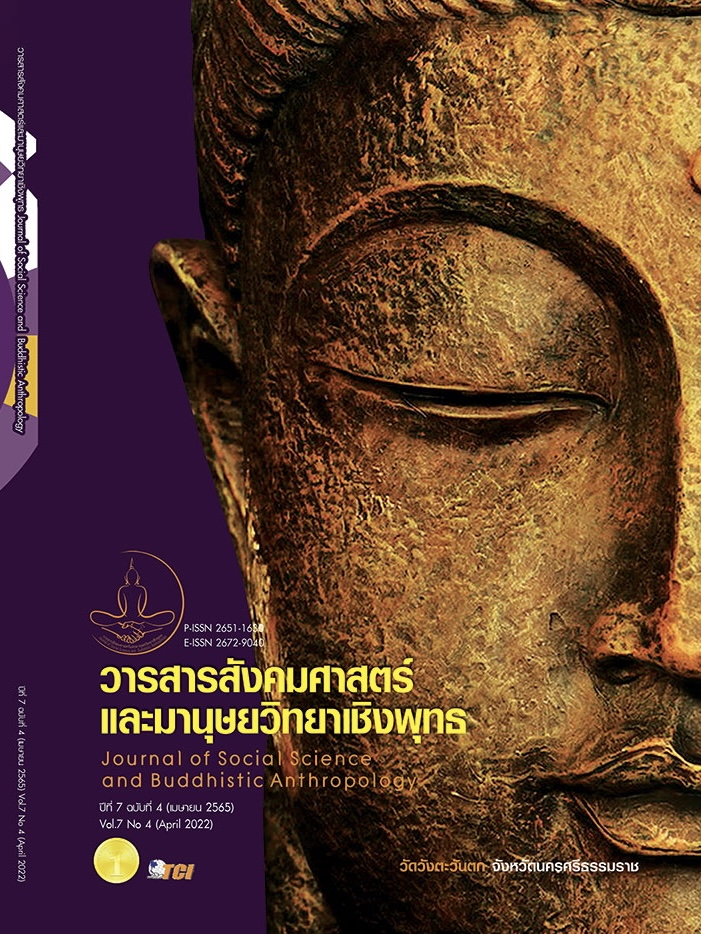ENVIRONMENTAL COMMUNITY RESPONSIBILITY STRATEGY OF CEMENT INDUSTRY IN SARABURI PROVINCE
Keywords:
Community Responsibility, Environmental, Cement industryAbstract
The objectives of this research article were to: 1) study the impact on the community affecting the community environmental responsibility strategy of the cement industry in Saraburi Province. 2) study the factors affecting the community environmental responsibility strategy of the cement industry in Saraburi province; and 3) study the development of the community environmental responsibility strategy of the cement industry in Saraburi province. It is a qualitative research. Data were collected from two groups of key informants, comprising the community around the cement factory in Saraburi province and the business sector. Non-profit business entities/organizations In Saraburi Province, there were 30 people. The instrument used to collect data was a semi-structured in-depth interview form. Descriptive data analysis, study results. The results of the study showed that 1) the impact on the community in the environment found that the environmental problems in terms of toxic air pollution or air pollution caused by garbage dumping The problem of incineration of lead and battery e-waste air pollution problem water and noise pollution 2) Factors affecting environmental community responsibility strategy. It was found that transformational leadership factors influenced policy making and decision making. Community Participatory Communication Factors Factors in corporate engagement strategy formulation affecting community environmental responsibility strategy and 3) community responsibility strategy development. It was found that corporate pollution prevention has clearly prevented pollution in the community. Social strengthening The organization promotes the development of people in the community to strengthen and preserve the environment. The organization promotes the use of resources in the community to be worthwhile.
References
จามรีม จันทร์สุวรรณ. (2561). อิทธิพลของภาวะผู้นำที่รับผิดชอบต่อสังคม การรับรู้ของผู้มีส่วนได้ส่วนเสียด้านความรับผิดชอบต่อสังคมขององค์การที่ส่งผลต่อภาพลักษณ์ของสมาคมยิมนาสติกแห่งประเทศไทย. วารสารสมาคมนักวิจัย มหาวิทยาลัยเกษตรศาสตร์, 23(1), 62-73.
ชัยณรงค์ เครือนวน. (2563). ยุทธศาสตร์การพัฒนาความเปลี่ยนแปลงปฏิบัติการทางสังคม และข้อเสนอเชิงนโยบายภายใต้การพัฒนาอุตสาหกรรมในพื้นที่มาบตาพุด จังหวัดระยอง. วารสารเศรษฐศาสตร์การเมืองบูรพา มหาวิทยาลัยบูรพา, 8(1), 25-46.
ชาญวิชย์ อริยาวรนันต์. (2563). ความรับผิดชอบต่อสังคมในอุตสาหกรรมยานยนต์กรณีศึกษาบริษัทโตโยต้า มอเตอร์ ประเทศไทย จำกัด. วารสารนวัตกรรมการบริหารและการจัดการ วิทยาลัยนวัตกรรมการจัดการ มหาวิทยาลัยเทคโนโลยีราชมงคลรัตนโกสินทร์, 8(1), 14-23.
ณฐพร พันธุ์อุดม. (2562). การจัดการเพื่อความยั่งยืนของบริษัทจดทะเบียนในตลาดหลักทรัพย์แห่งประเทศไทย. วารสารร่มพฤกษ์ มหาวิทยาลัยเกริก, 37(3), 96-103.
นพดล พันธุ์พานิช. (2563). กลยุทธ์ทางธุรกิจของวิสาหกิจขนาดกลางและขนาดย่อมหลังวิกฤตการณ์โรคติดเชื้อไวรัสโคโรนาสายพันธุ์ใหม่ 2019 ในประเทศไทย. วารสารวิจัยมนุษยศาสตร์และสังคมศาสตร์ มหาวิทยาลัยเวสเทิร์น, 42(4), 39-52.
ภัทรชนก เหลืองไพบูลย์. (2563). ความสำเร็จในการบริหารจัดการผลิตภัณฑ์ของโรงงานอุตสาหกรรมที่เป็นมิตรต่อสิ่งแวดล้อมอย่างยั่งยืน. วารสารสมาคมนักวิจัย มหาวิทยาลัยราชภัฏสวนสุนันทา, 25(1),254-270.
วีระศิษฏ์ แก้วป่อง. (2563). ปัจจัยทุนทางสิ่งแวดล้อม ทุนทางสังคมและวัฒนธรรมและทุนทางเศรษฐกิจที่ส่งผลกระทบต่อกิจกรรมถนนคนเดินข่วงเมืองน่าน. วารสารสิ่งแวดล้อมสรรค์สร้างวินิจฉัยคณะสถาปัตยกรรมศาสตร์ มหาวิทยาลัยขอนแก่น, 19(3), 80-96.
สานิตย์ หนูนิล. (2562). การสร้างความผูกพันกับผู้มีส่วนได้ส่วนเสีย:ปัจจัยสู่ความสำเร็จในการรับผิดชอบต่อสังคมขององค์กร. วารสารนักบริหาร วิทยาลัยพัฒนศาสตร์ ป๋วย อึ๊งภากรณ์ มหาวิทยาลัยธรรมศาสตร์, 38(1), 37-45.
สำนักงานคณะกรรมการเศรษฐกิจและสังคมแห่งชาติ. (2562). แผนพัฒนาเศรษฐกิจและสังคมแห่งชาติฉบับที่ 12 พ.ศ. 2560-2564. เข้าถึงได้จาก https://www.nesdc.go.th/ ewt_dl_link.php?nid=6422.
สำนักงานจังหวัดสระบุรี. (2563). ยุทธศาสตร์การพัฒนาจังหวัดสระบุรี. เรียกใช้เมื่อ 25 กันยายน 2564 จาก http://www.saraburi.go.th/logis/logistics/pan12.html
อทิพันธ์ ศักดิ์ศรี. (2559). นวัตกรรมการบูรณาการและส่งเสริมการลงทุนอย่างมีความรับผิดชอบต่อสังคม. ใน ดุษฎีนิพนธ์วิทยาศาสตร์ดุษฎีบัณฑิต สาขาวิชาเทคโนโลยีและการจัดการนวัตกรรม (สหสาขาวิชา).
จุฬาลงกรณ์มหาวิทยาลัย.
อภิญญา ตันสกุล. (2561). อิทธิพลภาวะผู้นำที่รับผิดชอบต่อสังคม การรับรู้ของผู้มีส่วนได้ส่วนเสียด้านความรับผิดชอบ ต่อสังคมขององค์การที่มีผลต่อภาพลักษณ์ของการไฟฟ้าฝ่ายผลิตแห่งประเทศไทย : กรณีศึกษาโรงไฟฟ้าพลังงานแสงอาทิตย์ทับสะแก จังหวัดประจวบคีรีขันธ์. วารสารสมาคมนักวิจัย มหาวิทยาลัยเกษตรศาสตร์, 23(3),178-189.
Porter, M. E. & Kramer, M. R. (2019). Creating Shared Value. In: Lenssen, G. and Smith, N., Eds. Managing Sustainable Business, Springer, Dordrecht, 323-346.
Puttachard, L. (2021). Business / Industry Outlook for 2020-2022: Building Materials Business .article. Bangkok: Krungsri Bank.
Wu, H.-C. (2020). Relationships between secure attachment, experiential co-creation and future experiential intentions in the tourism industry: The case of COVID-19. Retrieved Sebtember 25, 2021, from https://www.researchgate.net/publication/342137384_Relationships_between_secure_attachment_experiential_co-
creation_and_future_experiential_intentions _in_the_tourism_industry_The_case_of_COVID-19/fulltext/5ee4459d92851 ce9e7e04b6c/Relationships-between-sec
Downloads
Published
How to Cite
Issue
Section
License
Copyright (c) 2022 Journal of Social Science and Buddhistic Anthropology

This work is licensed under a Creative Commons Attribution-NonCommercial-NoDerivatives 4.0 International License.









